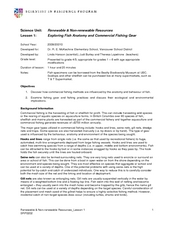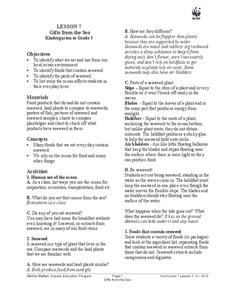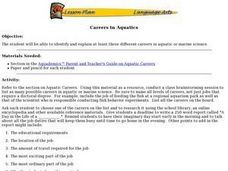Curated OER
Water Fun
Students examine uses for water. In this water lesson, students discuss how they use water. As a class students make a PowerPoint by naming one swimming safety rule. Students compare and contrast fishing for fun and fishing for survival.
Curated OER
To Fish or Not to Fish?
Students demonstrate the decision-making process for marine reserves designations. In this role-playing lesson students analyze maps and data relating to a proposed reserve. They formulate the best decisions based on overall issues.
Curated OER
Fish Are Animals Too
Students create posters that show how a shark is a major predator in kelp forests and coral reefs after studying the food webs for these ecosystems. They determine that fish are important animals in the ocean's web of life.
Curated OER
Exploring Fish Anatomy and Commercial Fishing Gear
Students investigate commercial fishing by exploring the technical methods. For this environmental lesson, students identify the fish that are most commonly consumed by humans and trace their path from ocean to plate. ...
Curated OER
Fishing
In this recreational worksheet, students study on how to assist a young boy in catching fish in a fishing maze with the boy on one end and the fish on the other end.
Curated OER
Gifts from the Sea
Students discover the oceanic food chain. In this healthy eating lesson, student investigate the fish we eat and the food the fish eat. Students discover what ocean animals eat seaweed and what everyday foods we eat that also...
Curated OER
Build an Anchialine Pond
Students explore biology by conducting a nature experiment. In this pond examination lesson, students utilize recycled materials, play-doh and water to recreate a pond and its inhabitants. Students identify the different elements within...
University of Kentucky
The Great Spider Debate
Poor, misunderstood spiders! They are feared, disrespected, and detested by many people, yet they do so many positive things. A great addition to any insect unit, learn about some of the more common spiders, while hopefully dispelling...
Curated OER
Activity Plan 5-6: Book-Character Homes
Students use their creativity to build character homes. In this early childhood lesson plan, students develop creative-thinking, social, language, math, and motor skills as they work together to create buildings for characters from...
Curated OER
Be an Artist
In this visual arts worksheet, 3rd graders will use a grid to recreate a given image. Using similar line segments in each box of the grid, students will recreate the image of a fish in the boxes provided.
Curated OER
What's Down There?
Investigate the coral reefs around Mokolai Island, Hawaii by researching and writing about improving the reef ecosystem. Students map threats to the ecosystem and use the list of key words to assist in their descriptions
University of North Carolina
Verb Tenses
Twelve categories of verbs exist in the future tense, ranging from simple present to future perfect progressive, but only three have a place in academic writing. Those three tenses make up the content of an informational handout that...
Curated OER
Turning the Tide on Trash: Marine Debris Curriculum
Six different lessons comprise this unit on marine debris. Science, language arts, social studies, and art projects make this an ideal interdisciplinary unit. The result will be well-informed future citizens who can help make a...
Curated OER
Vocab-u-lous! Build a Fabulous Vocab: Words Beginning with SC
In this vocabulary worksheet, learners select the best word choice to complete the sentence. They are challenged with words that have sc-blends.
Curated OER
Careers in Aquatics
Young scholars discuss careers related to aquatic or marine science. They write a report called "A Day in the Life of a (blank)." After reports are completed, if possible a person working in the field of aquatic or marine science is...
Curated OER
Creative Problem Solving
Students respond to a situation presented about the wetlands. For this wetlands lesson, students understand the various opinions over the use of areas in the wetlands. Students complete a worksheet using critical thinking questions about...
Curated OER
A Readers' Theatre for Bringing the Rain to Kapiti Plain
Second graders read and perform a reader's theater version of the story, "Bringing the Rain to Kapiti Plain." They complete a graphic organizer of cause and effect of their part in the story, look up vocabulary words on a dictionary...
Curated OER
Amazing Grazing: Keeping Our Ecosystem Running
Students discover the value of sustainability within our ecosystem. In this ecological lesson, students discuss the importance of a food cycle in our society, and how humans can improve the conservation of a healthy ecosystem. Eventually...
Curated OER
Keeping Watch on Coral Reefs
Students investigate the dangers Coral Reefs face by investigating satellite images. In this environmental protection lesson, students utilize the Internet to discover the types of satellites and sensors used to provide...
Curated OER
Gifts from the Sea
Students investigate parts of the ocean. In this seaweed lesson, students identify foods that contain seaweed, parts of seaweed, and how the ocean affects our lives. As a class students brainstorm ways we rely on the ocean and compare...
Curated OER
Natural Resources
Learners explore Iowa geography and topographic maps. In this geography and topographic maps lesson, student investigate maps, newspapers, Iowa flora and fauna. Students gain an understanding of how different landforms can be identified...
Curated OER
Salmon vs. Dams: The Dam Removal Debate on the Elwha River
High schoolers use roll playing to discuss the merits of tearing down these dams so that the Elwha River can run free. The activity is presented in the form of a council meeting to encourage students to try to build consensus in finding...
Curated OER
Using Commas for Clear Writing
In this commas worksheet, students learn to use commas to help write more clearly. Students complete three exercises with commas.
Curated OER
Reservoir Activity
Students research the economic importance of the major reservoirs in Illinois. In groups, they manage a budget for one of the lakes to promote tourism in the area. They also work together to create advertisements.























